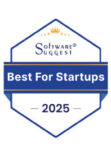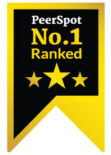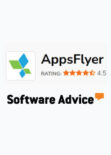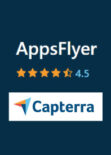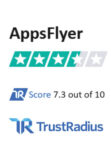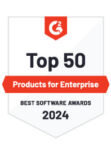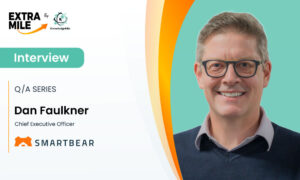Host: Hello and welcome everyone to ExtraMile by KnowledgeNile, an in-depth interview series featuring industry leaders and frontrunners. With this latest initiative, we aim to bring trendsetters in tech and commercial sectors closer to their audiences. I am your host Sayali, and we are here to examine the latest tech advancements, marketing practices, expert insights and a lot more.
For today's episode, we are super excited to introduce Tami Harrigan, Vice President of Business Development at AppsFlyer, a pioneer mobile marketing software provider. This firm has been assisting brands and their customers for more than a decade with great software choices, enabling advanced data analytics, fraud protection, engagement, deep linking, measurement and more. Harrigan's role has been for AppFlyer's progression, driving strategic partnerships and sustaining development.
Let us explore her professional journey, her perspective on latest tech trends and AppFlyer strategies. Welcome Tami, it's a hoot to have you with us today. Thanks so much for having me.
Tami: I'm thrilled to be here.
Host: So, Tami, you have excelled as a professional with over 15 years of experience. What have your major achievements and setbacks been over the years?
Tami: Yeah, over 15 years of experience, it's crazy to think about it that way. I really think about my career in kind of two major chunks with the big kind of defining moment was when I went and got my MBA at Kellogg School of Management, just north of Chicago. And so, in my pre-MBA life, I was working in the finance industry, I started my career in investment banking and then moved on to the very kind of typical career progression at that time, which was into private equity.
So, I spent the first five years of my career in finance, working as an analyst and working for kind of very long hours, and working really closely with M&A and public equities. And so, first part of my career was always kind of set up to kind of get me to my MBA. But I didn't necessarily know what I wanted to do with my MBA at that kind of early stage of my career.
And so, you know, in the time that I was in investment banking, and then private equity, we were kind of in a boom, and then we were in a bust. So, when I started at the private equity fund, Suoboda Capital based out of Chicago, Lehman Brothers fell within the first couple of weeks that I was there. And so, what that meant was, you know, the housing crisis was in, you know, full blown mode.
And we had a number of different portfolio companies that we were supporting and invested in that were kind of highly impacted by the housing crisis. And that was kind of like, I think, a big defining moment in my career for me, because I ended up working with this construction distribution company based out of the West Coast based in in Arizona, to be specific, in which was, you know, facing kind of huge major issues and being able to continue to grow and meet their kind of debt obligations in their business. And so, I've partnered really, really closely with the management team on operating model, we partnered really closely with the lender and the deal to kind of set up a unique financial structure, both on the equity and the debt side that allowed the company to kind of survive that very challenging couple of year period.
And ultimately, what we designed from a financial capital structure was the ability and the option for the management team to do a management buyout or an MBO at the end of a certain period when certain conditions were met. And while the kind of like the financial engineering that went into that was very, very in depth, and I was in the midst of all of that, what I really fell in love with at that time was the management side of it. And I saw kind of the passion and the grit and the hard work that goes into actually being an operator and not so much on the financial engineering side.
And that's really what inspired me in my MBA studies is to kind of move away from finance and move into an operator role. And it was really inspired by that management team and being able to really take that company and fight through it and see kind of the financial opportunity and gain from being on the operator side. And so that's what inspired me in my business school time to first take an internship in tech at eBay.
I was very passionate about e-commerce at the time, and it was a really growing side of retail. And so, I wanted to be on the tech side. So, I interned at eBay and then eventually took that opportunity into more of a long-term opportunity with NexTag, which is a comparison-shopping engine that competed with Google Shopping at the time, which is no longer, because we all know how that story ends when Google enters into a market.
And so, in that kind of early-stage post MBA, I found myself in a business that was really dying, like in our midst as Google kind of continued to invest in areas in which we just couldn't compete. And so, I found myself needing to kind of take another stab at really what my career was going to be and of the kind of high growth trajectory of Rocketfuel at that time, and then eventually transition. And so, then I found myself at Criteo and Criteo was a leader in retargeting and advertising for e-commerce players.
And it was really fun to be part of a partnership ecosystem there. I think one of the most defining moments of my career at Criteo was landing our deal with Shopify. And so Criteo had historically always focused on kind of a more mid-market to enterprise customer and had struggled to kind of win business with SMBs because of the scalability of how Criteo's technology worked when powering retargeting campaigns for a small business.
And so over time, that Shopify partnership was really challenging in order to shape. But a couple of things happened over the years. One is Shopify moved into a more enterprise client segment and that our technology also improved.
And so, we were able to kind of identify a deal structure in which Criteo and Shopify could leverage kind of the best of both of their worlds. And that's what I love so much about partnership is it's really being kind of very self-aware about, well, where does my business not perform as well and being able to identify where the opportunity is in another client for you to both benefit from where you excel. And so that's exactly what we did with Shopify in that deal that was announced now a couple of years ago.
And I think they're continuing to scale it since I've left with a number of different programs and investments around it, which brings me to AppsFlyer. And I think one thing that's consistently been with my career is that I am always really attracted to companies that are scaling and looking into new markets. And so that's exactly what I've done with AppsFlyer.
You know, the way that you introduced us is absolutely true. We're powering mobile measurement for the last 10 years, but I'm part of a business unit that's only really existed for maybe two years. I joined a little over a year ago and I represent a part of our business that's called Privacy Cloud, which is a suite of solutions that is all about data collaboration and data cleanroom and really this kind of trend in advertising that really is highly dependent on knowing who your consumer is and being able to personalize and customize messaging based on first party data.
And this is all against the backdrop of Google cookies going away. Of course, we've been fighting that battle when it comes to other operating environments like Safari for many years now. But with Google and the amount of market share that they have in the industry, first party data is the most important thing that any business has as an asset.
And being able to securely manage that first party data, but also while monetizing it, requires collaboration and it requires technology and software that allows you to govern the use of that data in a very, very secure way while maintaining privacy law throughout the world. And so, this is what I have the privilege of representing in the market today. And it's been a blast.
So hopefully that answers your question a little bit.
Host: Thank you so much for sharing an overview of your journey so far. It's very interesting to hear everything. So, moving ahead, what are your major responsibilities as the VP of Business Development at AppFlyer? And what challenges do you generally face in this regard?
Tami: Yeah, of course. I'm happy to share more. So, I would say nothing is off the table as VP of Business Development.
There is one thing that I know for a fact is that your job title is as ambiguous as can be. And so really no job is too small. No job is too big when it comes to my role.
But you can think about my role as being very commercially focused. And I am the eyes and ears of the field for our product and R&D teams. And so, as a result of that, I spend a lot of time kind of talking to customers, kind of understanding the market, being in market and hearing some of the challenges that are happening around first party data, commerce, media.
And so, I set all of our go-to-market strategy. And I also have a team of strategic account executives that are in their respective markets selling data collaboration software to various commerce media networks and ad networks around the world.
Host: So, going forward, why are analytics and measurements significant in mobile marketing? And how do these assist companies in setting their products and services impressively in the market?
Tami: Yeah, happy to answer. It's a great question. So, at the end of the day, it provides a foundation for making data driven decisions.
So, a big part of the advertising world is very, very accustomed to having data to make decisions. And that's what has made programmatic advertising so powerful as it has evolved across the years. And so, marketers need to know what drives user engagement, retention, and ultimately conversions in order to create campaigns that will drive the best possible experience for their users and be able to share those results.
And so, segmentation, personalization are at the heart of this. And we need to be able to iterate. And iterating usually requires having an A-B test.
And so that you can actually learn kind of what worked and what didn't and be able to adjust your strategy on the fly to ensure that we're always staying ahead of consumer behavior and trends, which happens kind of at micro moments in today's world and the way that we shop and the amount of connected devices that every consumer has from the time that they're four-year-old to the time that you're 80 years old plus, the ways that we are adapting to that as marketers have to continue to adjust.
And so, at AppsFlyer, we enable businesses to track and measure the entire customer journey from acquisition to in-app activity and allowing them to see which marketing efforts are most effective. And by the way, I'd be remiss to say not only digitally, but also through the collaboration platform, you can bring in data from brick and mortar, from real-life in-store transactions as well. And so, this really helps our customers to optimize their spending and focus on resources and strategies that deliver on whatever KPIs are for each campaign.
Host: So, speaking about data, what is the role of data privacy in today's technologically advanced market setup? And why should companies prioritize it while offering their services?
Tami: Yeah, data privacy is obviously a very complex topic, especially when you think about it on a market in the United States, in which I sit, in which privacy is being set at the state level. And then we have various legislation around the world. And so, you have LGPD in Brazil, and then you have GDPR in Europe, and they mimic one another in a lot of ways, but they're all unique to their various markets.
And so first of all, I think at AppsFlyer, we have a data protection officer whose sole job is to make sure that our company is privacy by design. And so, we design our software to help to support and really make it easy for our customers to make sure that they are meeting all local and federal privacy laws as they need. And so that's my goal as a data cleanroom provider.
And we're providing essentially all these privacy enhancing technologies. And the kind of promise that we make to our customers is, you know, I think what everyone's worst fear is when it comes to privacy is, you know, everyone works really hard to make sure that bad actors cannot take a certain action against your data. But it's also kind of just like the uneducated that are not necessarily bad actors, but maybe are not well enough informed and make a decision, you know, by mistake or without being educated.
And so, our software really builds that in being privacy by design is that even someone with good intentions who is ill-informed can't take on an action or a query with your first party data and unknowingly break a privacy law.
Host: So, moving forward, every industry has become highly competitive with new players entering the market regularly. Why is it important to gain a competitive edge under such circumstances? And how can it be done effectively?
Tami: Yeah, I mean, of course, competition is kind of always going to exist. And it's kind of in what form and in what way. And so, when I think about my own competition and data collaboration in such an immature market, I believe that data collaboration as an industry is what we need.
And so, when I talk to a customer or prospect that is already collaborating or using data cleanroom technology from a friend or a foe or a frenemy, if you will, that's a good thing. That means that they're educated. Right.
And that's a really great kind of leading point into a conversation about what value AppsFlyer can provide on top of what they're already doing. When it comes to competition for our customers and our prospects, we talk about this a lot and data transparency and insights as a key differentiator to your own value proposition to your customers. And using a data collaboration platform as a neutral and unbiased source of data and insights for your customers to help to propel them to be able to invest more because the trust that is delivered through offering a platform like this is a huge differentiator for ad that are all kind of vying for the same ad dollars.
And I believe that there will be winners and losers over the next couple of years as the number of ad networks continue to proliferate. What I talk to our customers and prospects about is don't be left behind. Insights are the way to go.
And if you don't believe me, just look at Amazon, right? They developed an entire business unit called Amazon Marketing Cloud to do exactly this. And so, this is really where we really believe that our customers can differentiate through software like data collaboration.
Host: So, speaking about business growth, what is the value of two businesses collaborating and how do you get it started?
Tami: Yeah, I mean, I think I touched on this a little bit in my last answer, but the value is really the trust and transparency that is delivered in a relationship when you are collaborating on first party data. But also like if you go beyond that and really like what tangible values are delivered out of data collaboration, it is an enhanced view of a customer journey. And so, in today's world, typically people think about it as like data rich companies and data poor companies.
Data poor companies are left with making decisions on kind of hypothetical data or syndicated data, third party data. And they're making kind of the best decisions that they can with limited data. But being able to collaborate on first party data is a huge unlock for these data poor companies.
But it's an unlock for a data rich company, too, because as a data rich company, you're probably taking for granted to a certain extent the data that you know and have on your users and how they behave and what they can do. But when you're in an advertising business, you need data to be able to project and know how you're going to grow your business. And so, data collaboration is really the huge unlock between a data rich and a data poor company.
But the data rich company can also benefit because that means that they actually are understanding more and more about the application and the value of the data, not just for their own company, but for those surrounding companies that they are partnering with, whether it's from an advertising use case or something else. And so that's the value. And that's really what we talk about in the market all the time.
But how do you get started? And that's a great question. Typically, what we see when businesses come to us and say, we really want to collaborate is they probably already have a hypothesis about how their businesses are working together, but they don't they aren't clear exactly how to answer the question.
And so, what we always typically advise when two businesses are starting to collaborate is let's work off of historical data. I mean, I think I think the grand idea of, you know, launching a campaign and lining up all the timing around creative and budget and all the people and ad operations that are required to kind of line up around a live campaign. It's very enticing.
But the reality of all those logistics can make getting to the starting line difficult. And so typically what we say is just to get started, let's put historical data into the platform from both sides so that you can see, at least on a look back basis, what were the results and insights resulting from that campaign. And then you at least have a baseline of understanding of, OK, if we move into this and to kind of a live scenario, which we're launching a campaign, we know what we can expect.
And we've also kind of been through it once. And that kind of frequency really helps.
Host: That's a great perspective to have on collaborations. Moving forward, personalized messaging and customer experience can drive higher sales and greater revenue. Do you agree?
And how impactful are our campaigns support for this purpose?
Tami: Yes, absolutely. You know, we've run some tests around this and certainly personalized messaging and customer experience 100 percent drives higher sales and more revenue for our customers. And so, you know, you can take an example.
And I think this is a really compelling use case of potentially a brand that is looking to reach their customers and they have some degree of first party data. But as we all know, everyday people opt out of being kind of part of your messaging. And so, I don't know how many times I do it a week where I say, you know what, I don't want to be contacted by, you know, XYZ brand anymore.
And so, all of a sudden to that brand, I become unreachable. They cannot reach me anymore. And so, what do they do?
How do they reach me if they know that I'm a high value or a high intent customer for them? And so, data collaboration is a way in which you can leverage a different party's first party data on me and still reach me in an environment in a privacy safe way. And so, when we ran tests in this regard, in which, you know, a certain subset of consumers had opted out of being reached directly by the brand, they were actually able to increase conversion rates on a kind of typical basis by three to four X.
And so that's a really compelling use case for a brand. And also, certainly like if you think about personalized messaging. So, this actually just happened over the weekend.
I got a mailer from Sephora talking about their VIB, like what is it called? Very important beauty member sale that's coming up in November. And I was shocked when I opened up the kind of the market mailer.
It was like a two-page document. When I opened it up, they actually had images of all the previous products that I had previously bought on Sephora in the marketing. I could not believe that at scale they were doing that.
So, every single person was having like four different products surfaced personalized to them. I was blown away by that. So, I mean, props to Sephora because I think that that level of personalization goes so long.
And if you think about if you even get into predictive, like, so let's not say it's like the eyeliner that I bought recently, but it's actually like a matching or complimentary shadow that goes with that. That could be even more compelling. So, do I believe in customized and personalized messaging?
Yes, absolutely. And the software that can help you to do that is really, really important.
Host: So lastly, how would you motivate young minds in the business development sector? And what should be their approach when aiming to establish a successful career?
Tami: Yeah, let me take a drink before that, because I think this is a really tough question. Because first of all, like I said, when I introduced myself, business development can mean so many different things to so many different companies and businesses. And so, I think first, it's important to define what does business development mean?
Because I think business development can be defined in a couple of ways is one is it's kind of that like tip of the spear for a company on an outbound sales motion. And so that's often-considered business development. And it absolutely is.
The kind of realm of business development that I'm in is more much more on kind of the partnership side in which you are what I like to call is I spend my time doing things that are not directly related to revenue, but I believe in a long term perspective that they will generate new business and so business development and more of a kind of a strategic sense rather than in a tactical sense. And I've spent the last 10 years of my career in some form of strategic partnerships, business development and corporate development as well. And so, when you talk about motivation, I mean, this is a very personal thing.
And I think when you're talking about business development, what kind of traits or personality types are kind of more likely to find success in this career? And so, for me, and again, this is just me, but hopefully this resonates for some of the listeners is motivation for me really comes from within. I am not motivated by too many external things.
I apply my own pressure to myself and that can be good and it can be bad. Don't get me wrong. But to me, motivation is and having kind of like a source for your motivation is really, really important.
And for me, I just have an innate drive to succeed. And I think that's because I am very much a goal driven person. I always have a goal.
I'm working towards something. And that's how I define success is if I'm meaning that kind of the personal timelines and milestones that I've set for myself. And so, the ultimate like, you know, definition of successes is how I've written it.
But again, I have an innate drive to succeed and I'm very competitive by nature. And that is just like who I am. And I cannot change it.
To be really honest, I love to win. And I love to play sports. And I love to win in the corporate world.
I always love to be the best at school. I had to be first. And that was just how I am wired.
And I realized that, you know, wanting to win all the time can also produce itself in kind of an undesirable way as well. So, let's be clear, like, just because I have a desire to win does not mean that I always win. I most certainly do not.
I've had plenty of failures and losses across many different kinds of elements of life. But a desire to win certainly motivates me. And I can confidently say that when it comes to effort, I'm always all in.
And if I'm going to do something, I'm going to do it with the intention to win. But again, I don't always win. But I think that is my superpower.
And that's what motivates me. So, you know, if I'm telling someone, you know, earlier in their career, what I think that they can do to be successful. I mean, I think there's not a clear formula, but I think you have to find your edge and what is going to work for you in order to find success.
And I think being really, really resilient and always looking for new angles is a really important part of that. And so, I'm always telling my team when it comes to deals, find a new angle. Like, if that angle didn't work for you, find a new one.
And I think about this from, like, my own career as well as, like, I'm always looking for a new angle of something that I can do or take on or improve on to be a more kind of developed package of things that I can offer an organization to drive growth and have a successful team. So back to your question, how would I motivate young minds? I mean, first, I would say when you're joining a company, make sure that you're surrounding yourself with managers, mentors and peers that also share your values and purpose.
So, you know, self-motivation is, I think, fed by a goal driven culture and community. And you will level up your skills and your career if you're surrounding yourself with people that you also believe are doing that this in the same way in their own fields, not necessarily in business development like me, but in the R&D or the product world. And then secondly, like I said, I'm a goal driven person.
I believe in having goals. And it can be like I have daily goals. I have weekly goals.
What am I getting done? But also, I have long range goals. Where do I want to be in one year?
Where do I want to be in five years? And map out what it takes to get there and what moves you need to be making along the way to do that. And having a mentor to help you kind of define that is also, I think, a huge help.
So, that's like how I would essentially motivate young minds. But then also in this function, I also really often wrestle with ambiguity. And so business development, like if you're not comfortable with ambiguity, this is probably not the field for you because there's so much ambiguity in what I do every day.
And it's often more of an art than a science. And so, to be successful, I would advise kind of two key areas to think about and develop a point of view on. So, first is learning business fundamentals and finding a way to be able to really hone your ability to derive insights from data.
And so, for me, this was investment banking and private equity where I worked really, really long hours and I had to build very complex financial models. And I also got to, at a very young age, sit in some pretty, I would say, insightful meetings. I sat in board of director meetings.
I sat with a C-suite, even as a 22-year-old investment banking analyst. And so I really surrounded myself with a lot to learn and to absorb and think about how to approach business problems. And I've been able to use that and apply that in a lot of different ways over the years.
And so that's the first thing. The second thing is to establish topical expertise. And so, choose an industry.
For me, it was marketing and advertising, but it may be for somebody else, healthcare, energy, finance, whatever that is. But build your career there because the thing that I know about business development is your network is so powerful. When you're talking about kind of building partnerships, developing strategic alliances, a network is really, really critical.
So, both as you're building out new business development opportunities for the company, you're at, but also when it comes to new career opportunities, your reputation will precede you. And having that depth and expanse of network in the field in which you have kind of dedicated yourself will take you a really, really long way. And so, I believe that your network is something that you should really, really invest in if you're going to be in business development, because it really, truly will, I think, make or break your career over time.
Host: That's some solid advice right there. And that's a wrap as well. Thank you so much, Tami, for sharing your wisdom with us today.
You've provided some crucial takeaways about business development, analytics, and business collaborations, which are really going to be helpful for our audiences. So once again, thank you so much for being our guest.
Tami: Appreciate it. Bye.
Host: Thank you, everyone, for joining us in this session of ExtraMile by KnowledgeNile. I am your host, Sayali, signing off. See you soon in the next episode with our next visionary leader on board sharing their insights.
Until then, please stay tuned.

